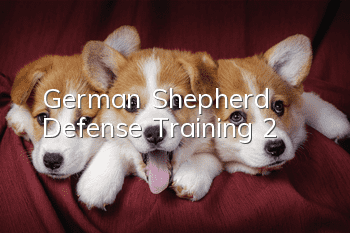German Shepherd Defense Training (2)

Levels of defense training Defense training is divided into three levels, including defense level one, level two and level three.
Dogs undergoing Level 1 defense training must be at least 18 months old. German Shepherds taking the Level 1 defense exam must first pass a full-time referee to test the dog's personality (temperament). The first-level defense examination mainly includes: walking with a leash, walking without a leash, sitting down while walking, lying down while walking, sitting and lying waiting, and free running and returning. In these tests, whether on flat ground or in a training area with obstacles, the dog must return immediately after hearing the command. At the same time, in the traveling search test, the dog must continue to walk on the prescribed route for at least 20 minutes.
To participate in defense level two training, dogs must be 19 months old and must pass the defense level one test. At the same time, they must again pass the command obedience and basic defense technology tests required by defense level one. In addition, the defense level two test items are more than The first level of defense is more difficult, more demanding, and has a higher level, which is mainly reflected in the dog's endurance, agility, flexibility, and control. A sloping wall spanning 6 feet was added, and in the walking search test the dog must be able to search along a designated route for at least 30 minutes while being led by a stranger.
To participate in defense level three training, dogs must be 20 months old and must have earned the qualifications for defense level one and defense level two. The defense level three exam is much more difficult than the previous two levels. During Defense Level 3 testing, the dog must be off leash. At the same time, walking and running tests are added, especially in the walking search test, the dog must continue to walk along the prescribed route for more than 50 minutes under the leadership of a stranger. There should be four turns on the prescribed route, three hidden objects must be placed, and the dog must find at least two.
What behaviors does the defense examination judge look for in the dog?
In all three levels, searching along designated routes, command obedience and basic defense techniques each account for 100 points, totaling 300 points. If a dog cannot reach 70 points in the two subjects of searching on designated routes and command obedience, and cannot reach 80 points in the basic defense skills subject, at the same time, if the dog fails the personality (temperament) test at the beginning or during the examination , then this dog will mean that it cannot pass this defense examination and obtain the defense level qualification. It must be retested in future examinations, and the subjects that passed this time must also be retested. In all tests, the referee should focus on observing the test dog's desire to work, energy concentration and work accuracy. The dog should show happiness throughout the test. Dog lovers need to be reminded here that those dogs that obtain higher grades and scores in competitions and exams are often those that behave naturally in the exams and have no or few signs of heavy training. It's really interesting to experience this feeling carefully and grasp this sense of proportion. It's really a bit "Zen".
Does the dog like to receive defense training?
Any experienced dog trainer firmly believes that German Shepherds like to receive such training very much, because only during training will the owner give full attention to the dog, and this is the greatest satisfaction for the dog . The most interesting thing is that training can cultivate the dog's natural instincts. Of course, these trainings should not make the dog feel suppressed or forced. This is clearly stated in North American training concepts and rules. In fact, defense training often makes dogs feel very free and happy, and eager to perform and be recognized. A dog trained for defense can do anything for its owner as long as the owner gives a signal. Dogs can get pleasure from work, show good self-confidence, and are eager to perform well for their owners. Dog owners can also judge the dog's working ability through the dog's performance during training.
Defense training is an essential ability for companion dogs
For thousands of years, dogs have been regarded as a model in the animal kingdom that can establish a mutually supportive and loving relationship with people. Dogs have highly developed senses of hearing and smell and can run at high speeds, capture prey, protect companions and alert the owner. Of course, people also provide selfless help to dogs, such as protecting dogs from attacks by large carnivores; taking care of injured dogs; human hugs satisfy dogs, etc.
Defense training is the most prominent expression of a dog's working ability, and dogs that have been trained for defense are usually ideal family companions who can be trusted and relied on. A well-trained German Shepherd can fully accept all its living environments, such as: heat, cold, noise, too many people, fright, etc., and the dog can show a fearless attitude towards it and will never be afraid of it. Behaviors such as nervousness, uneasiness, worry, aggression, and howling may occur.
In short, defense training can give dog owners many ways to control German Shepherd dogs, and at the same time, it also gives dogs a lot of free space, so that dog owners and dogs can have more fun together. Through defense training, on the one hand it brings joy to the dog, on the other hand it also allows the dog to know how to win the favor of its owner, and at the same time strengthens the close connection between the owner and the dog.
- How to train a dog’s basic movements
- What foods should Alaskan dogs not eat?
- Dog always vomits yellow water with foam
- Why do dogs come running when they hear tut-tut sounds?
- Owners often leave their dogs, and 30% of dogs suffer from separation anxiety!
- Symptoms of fungal infection in dogs
- Why is the top of my dog's nose turning pink?
- What are the symptoms when a puppy has a fever?
- Why does a female dog eat her own newborn puppies_A female dog vomits up her dead puppies
- Can dogs prolapse their anus?



